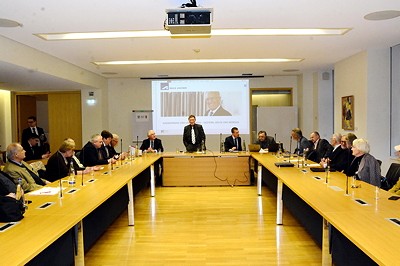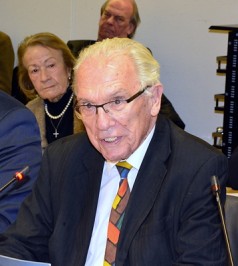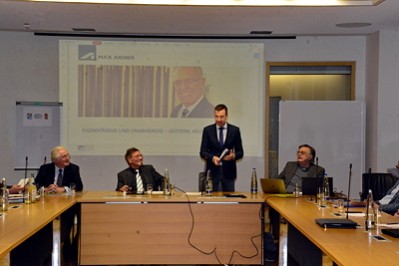

Joint event
Partner Hungary
14 March 2024
Bavarian State Parliament, Maximilianeum in the White Rose Hall
Firstly, an apology for the late report: we had tried to obtain the presentations shown at the event for publication, in one case we did not receive a reply, in the other case publication was not permitted. You can access publicly available statistics here.
After being welcomed by OWWF Bavaria President Eberhard Sinner and Dr Helmut Palder as President of the Bavarian-Hungarian Forum, the Consul General of the Republic of Hungary, Gábor Tordai-Lejkó, spoke about the historically grown and currently very good relations between Bavaria and Hungary. Many branches of important Bavarian companies such as Audi in Györ, BMW in Debrecen and, last but not least, the Max Aicher Group are evidence of this.
The senior director of the group, which is a member of both associations, Max Aicher, was present in person and briefly outlined the path taken to build up his companies. Managing Director Stephan Lemgen outlined the group's activities. Around 90 % of turnover is generated in the steel production sector. Max Aicher recognised very early on that scrap is a valuable raw material for the production of high-quality steel. This fact is proving to be particularly far-sighted today, when the European steel industry is in turmoil.
Max Aicher also invested in Hungary at a very early stage and was thus able to gain an important position in the steel market there. Co-operation with the authorities was also very easy. The Hungarian plant was thus able to steadily expand its output.
Adrian Stadnicky, the responsible Regional Director for Central Eastern Europe, summarised the opportunities and challenges for German companies on the Hungarian market in a video feed. On the positive side, he said, Hungary is a strategic growth market with a general digital affinity. There are targeted funding programmes as an incentive for research and development. Last but not least, the short distance and the issue of "nearshoring" is an important advantage, especially at a time when the diversification of value creation sources is becoming increasingly important.
Challenges include a recognisable shortage of qualified specialists, the high dependence on fossil fuels (read the report on the "EU Eastern Enlargement" event), inflation, unequal income distribution and risks posed by Hungarian economic policy, which attempts to favour national companies in "strategic" sectors.
The event was concluded with a lively discussion round. In the subsequent get-together over a Bavarian snack, opinions were exchanged in personal dialogue.



